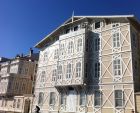Having recently been to see Rossini’s Maometto Secundo at the Atatürk Cultural Centre, and having had my appetite for opera whetted as a result, I resolved to repeat the experience. Accordingly, on Thursday March 14 I revisited the AKM (Atatürk Kültür Merkezi), this time to see the Istanbul State Symphony Orchestra and Opera Company perform Mozart’s opera Don Giovanni.
An additional reason for my visit was that I wished to see for myself what the acoustics are like in the furthest recesses of the Türk Telekom Opera Hall. As I had predicted, they were less than satisfactory. Furthermore (let us unveil the pyramid of stone, but speak these words in an undertone) – the music was not up to the high standard that had been set by Maometto Secundo. But then, when is the second time around ever as good as that initial blast of beatitude?
Nevertheless, I take full discredit (is that a word?) for my decision to expose myself to disappointment. There is room for sour grapes as well as sweet ones; I regret nothing. William Blake, as usual, said it all:
Grown old in Love from Seven till Seven times Seven
I oft have wishd for Hell for Ease from Heaven.
The gods must have been listening to my inner dialogue, and duly obliged with a custard pie. Before the performance, I fancied a quick cup of Turkish coffee, and descended to the drinks counter on the lower floor. When I placed my order, however, the young lady at the cash desk informed me that as only ten minutes were left before the performance was due to begin, she would not let me have the desired coffee. I meekly turned away, resolving to delay gratification until the interval, and also (of course) to get to the drinks counter earlier this time. Poor fool!
In the auditorium, I had chosen for myself a seat in one of the corners at the back that guaranteed a poor view of the stage – and, as it turned out, one that confirmed my suspicion that the acoustics in the AKM are anything but perfect if you are not sitting in one of the pricier seats. What one hears – or (more to the point) does not hear – if one sits in one of the balconies I have yet to discover, but am determined to find out when the time is ripe and I have remembered to bring along my trusty ear trumpet.
Now to the performance. First, let us get the negatives out of the way. Number one: I did not think much of the decor, which was somewhat on the plain side. No doubt Maometto Secundo had eaten up the lion’s share of the budget, and I fully understand and endorse the decision to allow it to do so: from the visual point of view, that sumptuous production was magnificent in every respect. Number two: in this performance of Don Giovanni, there was a problem with the music – namely, the lack of coordination between the singers and the orchestra. This was a constant fly in the ointment: the former were almost invariably slightly behind, or slightly ahead of, the latter. I suspect that a few more rehearsals would have sufficed to put things right. But then, we all have our off-days when we just do not feel like singing or playing – days when the cup of coffee we have been longing for tastes bad, or is spilled, or an insect kamikazes into it. (Prophetic words!)
At the interval, I duly presented myself at the drinks counter on the lower floor once again, and ordered a Turkish coffee. The coffee that was eventually handed to me was both stone-cold and unpleasantly grainy; when I gave it back to the young man who had served it to me with a complaint about its temperature and consistency, he did not offer either to make another cup, or to refund my money. He just took it, and served another customer. “Serves you right,” I thought to myself, “for being such a misery.” In a strange kind of way, it gave me a feeling of satisfaction to see the unerring accuracy with which the outer world had reflected my wallowings in self-pity back at me. The lesson: every inner jeremiad will boomerang. Fate has no shortage of custard pies.
And so, with some relief, I will now turn to the positives about the performance of Don Giovanni on March 14. Firstly, this production was excellent from the acting point of view. The actor who played Leporello (Don Giovanni’s sidekick) was especially talented in this direction, and his elocution and voice projection were likewise top-notch. Secondly, having a man wearing outsize bull’s horns sidle silently up to each character and caress them when they were undergoing an unworthy temptation of some description was entirely appropriate, and a nice touch: after all, Taurus is the home sign of Lady Venus. (Bless her!) Ancient astrological wisdom, however, has it that this planet is ‘In the mouth sweet, but in the belly bitter’ – and in the case of Don Giovanni himself, this dictum is absolutely spot on: in the end, after committing a murder for which he shows no sign whatever of contrition, not to mention indulging in multiple acts of insouciant duplicity and infidelity, he gets his comeuppance big time. But more of this anon: I have saved my highest praise for this performance till last.
Mozart’s two-act opera Don Giovanni was written in 1787 to a libretto by Lorenzo Da Ponte, a Jewish native of Venice who later emigrated to the United States and became the first-ever Professor of Italian Literature at Cornell University. It was Da Ponte, in fact, who supplied the libretto for Mozart’s other two smash-hit operas – The Marriage of Figaro (1786) and Cosi fan tutte (1790). When first performed (in Prague, where it had been commissioned after the composer’s successful trip there in the first two months of 1787), Don Giovanni was rapturously received. Rumour has it that Mozart finished work on it only the night before it was due to receive its premiere; here, in fact, there is an interesting parallel with Rossini, who was notoriously lackadaisical in the matter of deadlines. Indeed, on the very day of the first performance of one of his operas, not one single note of the overture had been written; the manager of La Scala therefore confined Rossini to a room at the top of the opera house and set four scene-shifters on guard over him. As the composer completed each sheet of music, these men threw it out of the window to be seized by the copyists waiting below. Mozart, of course, was never so unashamedly laid back as that, but even so Don Giovanni was not ready for the visit to Prague of Archduchess Maria Theresa of Austria on 14 October 1787 (the day when its premiere was supposed to take place), and The Marriage of Figaro was substituted for it at the last minute.
By far the most compelling scene in the whole opera is the last. In their article on the Encyclopedia Britannica website, after describing some of the clever musical touches Mozart gives to the score earlier on in the work Linda Cantoni and Betsy Schwarm describe this scene as follows:
Of far more dramatic musical impact is the entrance of the vengeful ghost (specifically, a stone statue come to life) near the end of the opera. He has come to demand repentance of the villain; otherwise he is prepared to take Giovanni to hell. The music by which the ghost appears is some of the most formidable that Mozart would ever write. He had placed hints at the beginning of the overture; the foreboding chords symbolise Giovanni’s fate and foreshadow the massive movement of the statue that will end the libertine’s adventures. The scene is so powerful that many performances in the 1800s ended with Giovanni’s descent into hell rather than with Mozart’s light final scene.
Here is a link to the full article.
Indeed, it was with this scene that the performance on March 14 ended, and rightly so: any other ending than this would surely have been an anti-climax. Suddenly, the singers and the members of the orchestra raised their game and were perfectly in sync; I shivered involuntarily, and the hairs on the back of my neck stood on end as the apparition made its way with chillingly deliberate steps from the back of the stage to the place where Don Giovanni lay, transfixed and in deadly fear.
And so the performers, unlike the opera’s anti-hero, redeemed themselves at the last moment.
Here is a recording of Mozart’s Don Giovanni from the Salzburg Festival in 1987. (This is the version in which the apparition scene is followed by a happy ending, by the way.) Conductor Herbert von Karajan, now near the end of his career on the podium, is giving it his all, which is nice to see.
Next time I go to the opera, I shall certainly go in a more sanguine frame of mind, having learned my lesson; Inshallah the universe will respond with a decent cup of coffee, meanwhile keeping its custard pies firmly tucked away, the flies banished from the ointment and the grapes (courtesy of Lady Venus) sweet in both mouth and belly.


_The_Golden_Horn_at_Dusk_c._1900_140_92_80.jpg)



